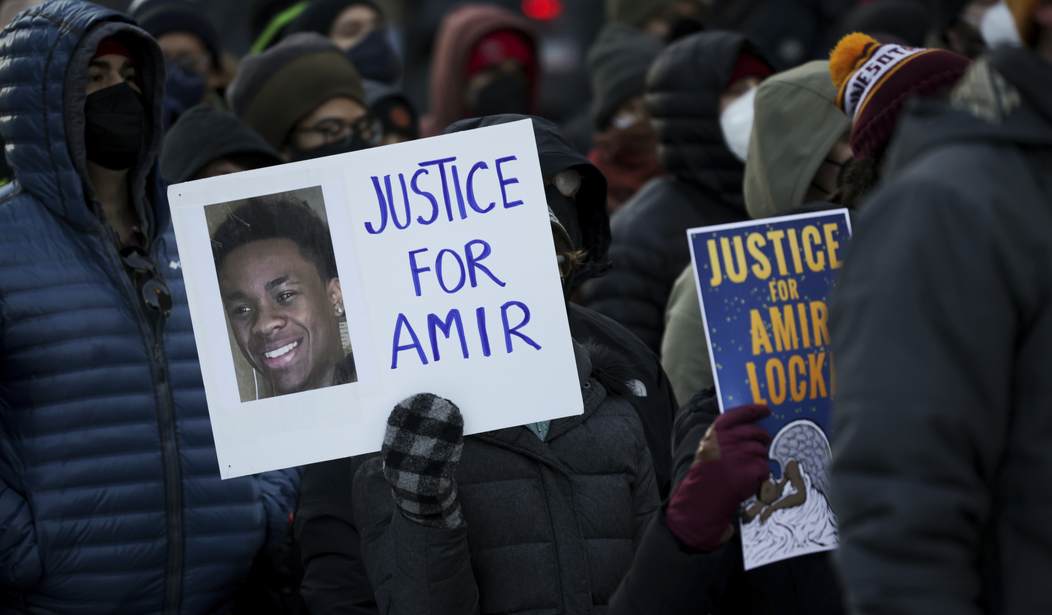The Minneapolis police officers who killed Amir Locke stormed into the apartment where he was sleeping before dawn on Feb. 2, shouting orders. They said they took that approach to "decrease the risk for injuries."
That strategy is dubious even when cops are confident that the home they are invading is occupied only by criminal suspects. It is beyond reckless when they have no idea who might be there, especially in a country where citizens have a constitutional right to armed self-defense.
Locke, a 22-year-old aspiring hip-hop artist who was planning a move to Dallas, was staying with his cousin in the meantime. The Minneapolis SWAT officers who woke him up that morning as he slept on his cousin's couch were assisting the St. Paul Police Department by serving a "no-knock" search warrant seeking evidence for a homicide investigation in which Locke was not a suspect.
Body camera video shows the officers quietly unlocking the door to the apartment at 6:48 a.m. before charging in while shouting, "Police -- search warrant!" and, "Get on the ground!" An officer kicks the sofa where Locke is sleeping under a blanket, which seems to rouse him.
Seeing a gun in Locke's hand, Officer Mark Hanneman immediately fires three shots. Nine seconds have elapsed since the cops entered the apartment.
The Minneapolis Police Department claimed Locke pointed his gun "in the direction of officers." But the video shows the gun pointed toward the floor with Locke's index finger on the barrel rather than the trigger.
Here is how Benjamin Crump, a lawyer representing Locke's family, summed up the situation: "Strange people bust in his house, awaken him from his sleep, and he reached for his weapon, which he had a Second Amendment right to, to defend himself." Locke's father said, "Amir did what ... any reasonable, law-abiding citizen would do to protect himself."
Recommended
Rob Doar, a senior vice president at the Minnesota Gun Owners Caucus, agreed. "Mr. Locke did what many of us might do in the same confusing circumstances," Doar said. "He reached for a legal means of self-defense while he sought to understand what was happening."
Interim Minneapolis Police Chief Amelia Huffman suggested that Hanneman's decision to shoot Locke was likewise reasonable in the circumstances. "The officer had to make a split-second decision," she said, based on his assessment of whether "he needed to take action right then to protect himself and his partners."
If this situation sounds familiar, that's because the same basic scenario has been playing out in cities across the country for years. Cops who burst into a home, hoping a sudden, overwhelming and discombobulating show of force will "decrease the risk for injuries," can easily be mistaken for violent criminals.
That's what happened during the 2020 Louisville, Kentucky, drug raid that killed Breonna Taylor, an unarmed 26-year-old EMT who, like Locke, had no criminal record. Taylor's boyfriend, Kenneth Walker, responded to the middle-of-the-night home invasion by grabbing a gun and firing a shot at the intruders, which provoked the hail of bullets that killed Taylor.
Local prosecutors initially charged Walker with attempted murder of a police officer but dropped that charge a couple of months later, implicitly recognizing that Walker had a strong self-defense claim. At the same time, prosecutors concluded that charges against the officers who killed Taylor were not justified, and Kentucky Attorney General Daniel Cameron concurred that they too had acted in self-defense.
To avoid lethal confrontations like these, reformers frequently propose banning or restricting no-knock warrants. But the Taylor case shows that solution is inadequate.
The Louisville cops banged on the door of Taylor's apartment for about 30 seconds before breaking in and claimed they also announced themselves. She and Walker still did not realize the intruders were police officers.
What's needed is a fundamental reevaluation of "dynamic entry" tactics, which should be reserved for life-or-death emergencies. Routinely deploying them when police execute search warrants is an invitation to tragedies like Locke's senseless death.

























Join the conversation as a VIP Member